Physical Address
304 North Cardinal St.
Dorchester Center, MA 02124
Physical Address
304 North Cardinal St.
Dorchester Center, MA 02124
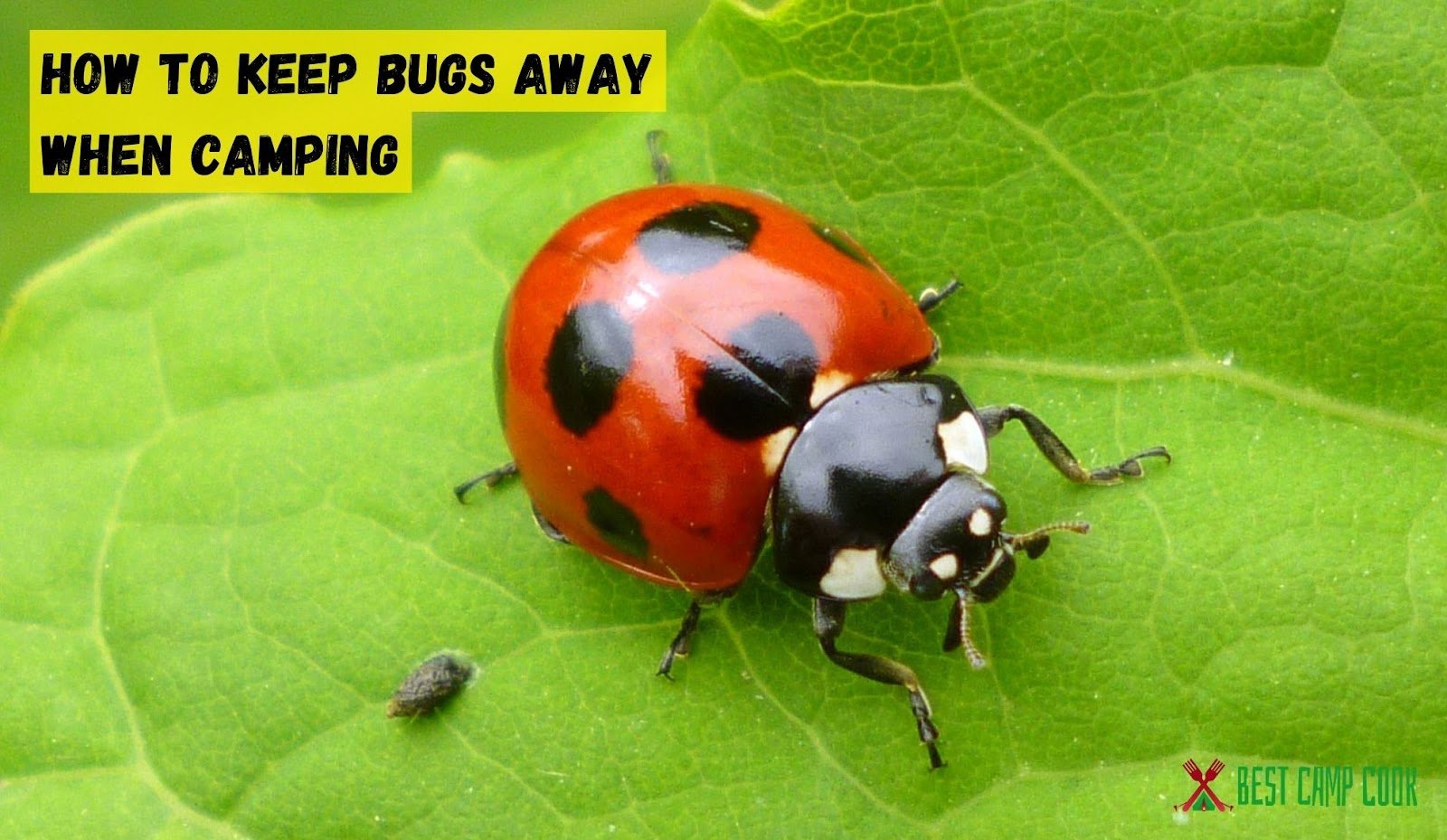
Are bugs ruining your camping experience? Discover effective strategies for keeping bugs at bay with our guide on “How to Keep Bugs Away When Camping.” Say goodbye to itchy mosquito bites and annoying pests that disrupt your outdoor adventures. Whether you’re planning a serene camping trip in the woods or an exciting beach getaway, our expert tips and tricks will help you enjoy bug-free nights under the stars.
From choosing the right campsite to using natural bug deterrents, we’ve got you covered. Don’t let bugs take over your camping fun. Get ready to reclaim your outdoor experience with our essential guide. Let’s dive in and learn how to keep bugs away when camping!
Main Summary: How to Keep Bugs Away When Camping?
While camping, apply insect repellent on exposed skin and wear long sleeves and pants to reduce their access. Setting up a screened tent provides an additional barrier against pesky insects, and avoiding sweet-scented products helps deter them. Maintaining a clean campsite also prevents attracting bugs.
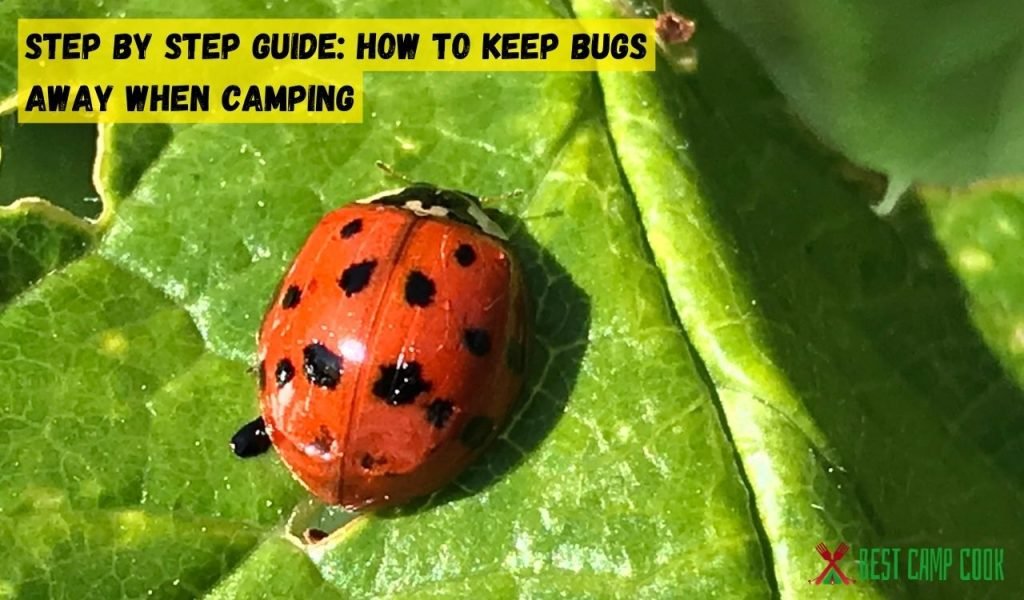
Selecting the perfect campsite goes beyond beautiful views and a flat surface for your tent. To ensure a bug-free camping experience, consider the following factors when choosing your campsite:
Mosquitoes, notorious bloodsuckers, thrive in areas with stagnant water. Be on the lookout for nearby ponds, swamps, or marshes, as they provide breeding grounds for these pesky insects.
Instead, opt for campsites located away from standing water sources. Higher ground areas tend to have better airflow, reducing the chances of encountering mosquitoes.
Bugs, such as ticks and chiggers, often hide in tall grass and dense vegetation. Check for campsites that have open spaces or cleared areas, minimizing the chances of these insects making their way into your camping space. Steer clear of campsites with overgrown vegetation or those surrounded by thick foliage.
Bugs, especially flying insects like gnats and flies, tend to avoid windy areas. Look for campsites situated in open spaces where there is ample airflow. The gentle breeze acts as a natural deterrent, making it less likely for bugs to approach your camping area. Additionally, wind helps disperse the scents that might attract bugs.
While it’s tempting to camp under a thick canopy of trees for shade, it’s important to balance sun exposure and bug prevention. Bugs are less prevalent in sunny areas due to the increased heat and sunlight Look for campsites that offer a mix of shade and sunlight. This way, you can enjoy the benefits of both without compromising on bug control.
Different regions have their own unique bug populations and activity levels. Before choosing a campsite, do some research on the local insect activity during the time of your camping trip. Check for any prevalent issues with mosquitoes, ticks, or other bothersome bugs. This information will help you make an informed decision and select a campsite with minimal bug interference.
Certain campsites may have specific attractants that invite bugs. For example, campsites near flowering plants or fruit trees tend to attract bees, wasps, and other flying insects. If you’re looking to avoid these bugs, consider campsites away from areas with abundant nectar sources. Additionally, be mindful of campsites close to areas where food is prepared or stored, as they can attract ants and other scavenging insects.
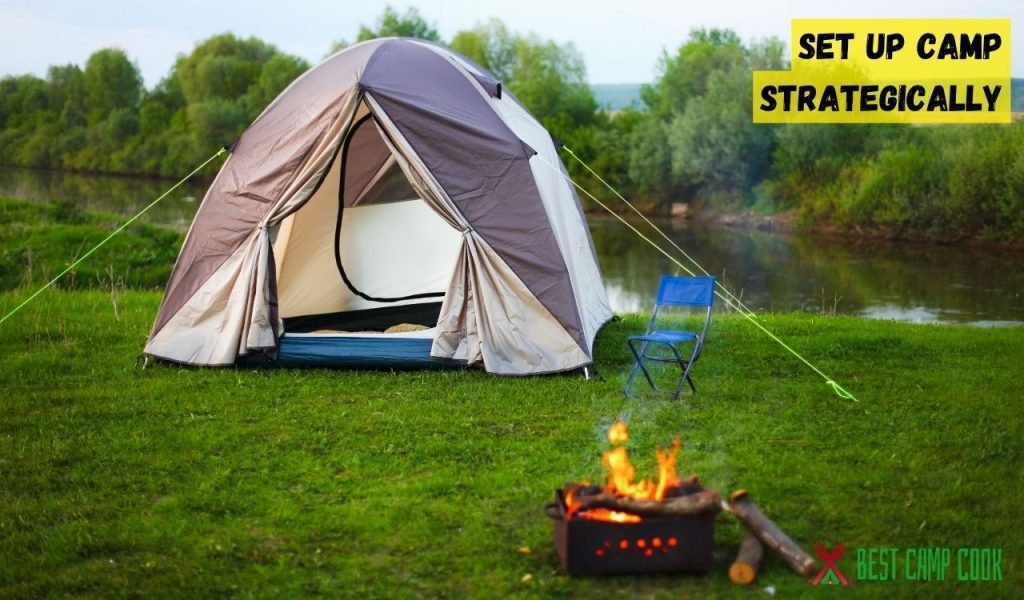
When setting up your campsite, a strategic approach can help minimize bug encounters and maximize your comfort in the great outdoors. Follow these tips to establish a bug-resistant camp:
Before pitching your tent, take a few moments to clear the immediate area of debris, fallen leaves, and any other potential bug hiding spots. Remove rocks, branches, and other items that could attract insects or provide shelter for them. Creating a clean and open camping space reduces the likelihood of bugs finding their way into your living area.
Bugs are naturally attracted to light sources, especially during the evening hours. When selecting your campsite, try to position it away from artificial light sources, such as campfire areas, lanterns, or neighboring campsites with bright lights. This will help minimize the number of bugs that are drawn to your camping space.
Nature can provide natural barriers that deter bugs from entering your campsite. Look for opportunities to set up your camp near natural bug repellents. For example, camping close to fragrant herbs like sage, rosemary, or lemongrass can help repel mosquitoes and other insects.
Additionally, consider positioning your campsite near natural barriers like streams, rivers, or dense vegetation, as they can act as deterrents for certain bugs.
Bugs are notorious for being attracted to food. To keep them at bay, ensure that your food is properly stored and sealed. Use airtight containers or coolers to store your food items, and keep them away from your sleeping area. Hanging food from a tree branch, using a bear canister, or storing it in a secure location can help prevent bugs from being enticed by the smell.
Invest in quality bug screens and nets to protect yourself from bugs while you sleep or relax in your camping area. Ensure that your tent has a reliable bug screen to prevent insects from entering. Consider using mosquito nets for sleeping areas, picnic tables, or outdoor seating areas. These protective barriers will create a bug-free zone within your campsite.
Maintaining cleanliness in your campsite is key to deterring bugs. Clean up any spills or food crumbs promptly to avoid attracting ants and other scavenging insects. Dispose of trash properly in sealed bags or containers to prevent bugs from being lured to your campsite. Additionally, keep your camping gear and personal belongings organized and free from dirt or food residues.
Bugs, particularly mosquitoes, breed in standing water. Avoid creating breeding grounds by minimizing the presence of standing water in your campsite. Empty or cover containers that collect rainwater, such as buckets, pots, or tarps. If you need to store water for cooking or drinking, use tightly sealed containers to prevent bugs from accessing it.
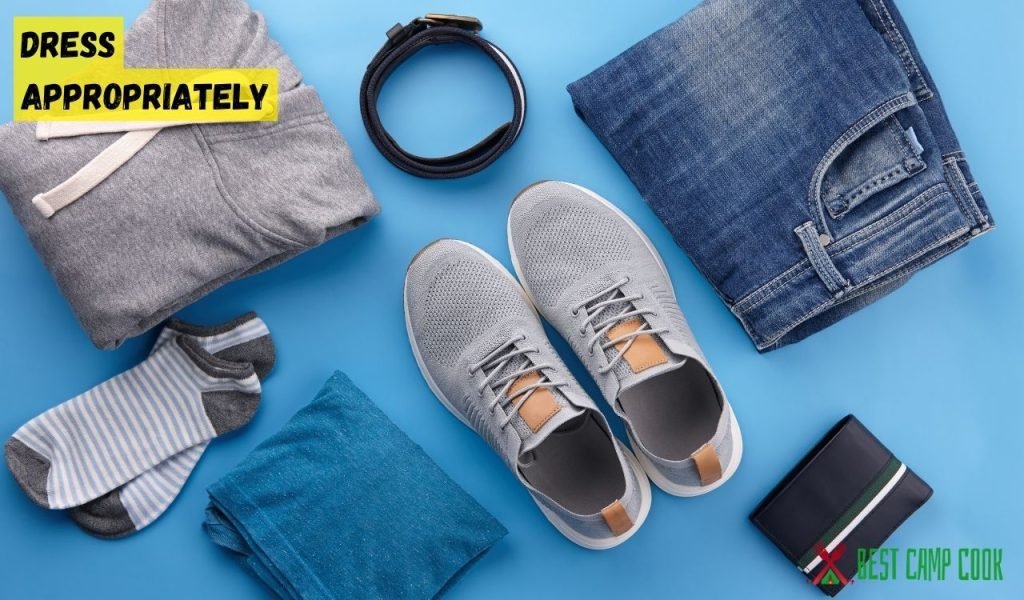
Choosing the appropriate clothing for your camping adventure can significantly reduce your exposure to bugs and minimize the chances of insect bites. Follow these guidelines to dress appropriately and keep those pesky bugs at bay:
One of the simplest and most effective ways to protect yourself from bugs is to cover as much of your exposed skin as possible. Opt for lightweight, loose-fitting clothing that covers your arms, legs, and neck. Long-sleeved shirts, pants, and high socks are ideal for creating a physical barrier between you and the insects. Additionally, consider wearing a wide-brimmed hat to shield your face and neck from bugs, especially during hikes or outdoor activities.
Bugs are often attracted to dark colors, so selecting light-colored clothing can help reduce their interest in you. Lighter shades, such as white, khaki, or pastels, are less likely to attract bugs compared to dark colors like black or navy. Additionally, light-colored clothing makes it easier to spot any crawling or flying insects on your attire, allowing you to take necessary precautions.
For added protection, consider investing in insect-repellent clothing. These garments are specifically designed to repel bugs and are treated with insect-repellent chemicals like permethrin. Look for shirts, pants, and socks that are labeled as insect-repellent or have built-in bug protection. Such clothing provides an extra layer of defense against mosquitoes, ticks, and other biting insects.
Prevent bugs from sneaking inside your clothing by tucking your pants into your socks and your shirt into your pants. This may not be the most fashionable choice, but it creates a barrier that bugs would have to crawl over to reach your skin. Tucking your clothing also helps keep ticks, which often climb up from grass or shrubs, from finding their way onto your body.
Certain scents, such as perfumes, heavily scented soaps, or lotions, can attract bugs. When camping, it’s best to avoid using products with strong fragrances that might make you more appealing to insects. Opt for unscented or lightly scented personal care products to minimize the chances of attracting bugs with overpowering scents.
Before heading out, ensure that your clothing is free of gaps or entry points that bugs can exploit. Check your clothing for holes, loose seams, or openings that insects could crawl through. Repair or patch any damages to maintain the integrity of your bug-resistant attire. Pay close attention to areas such as cuffs, collars, and waistbands, as bugs can easily find their way inside through these openings.
Even with proper attire, it’s essential to use insect repellents to provide an additional layer of protection. Apply an EPA-approved insect repellent to exposed skin areas, following the product’s instructions carefully.
Look for repellents containing active ingredients like DEET, picaridin, or oil of lemon eucalyptus, as these are effective in repelling a wide range of bugs. Remember to reapply the repellent as needed, especially after swimming or sweating.
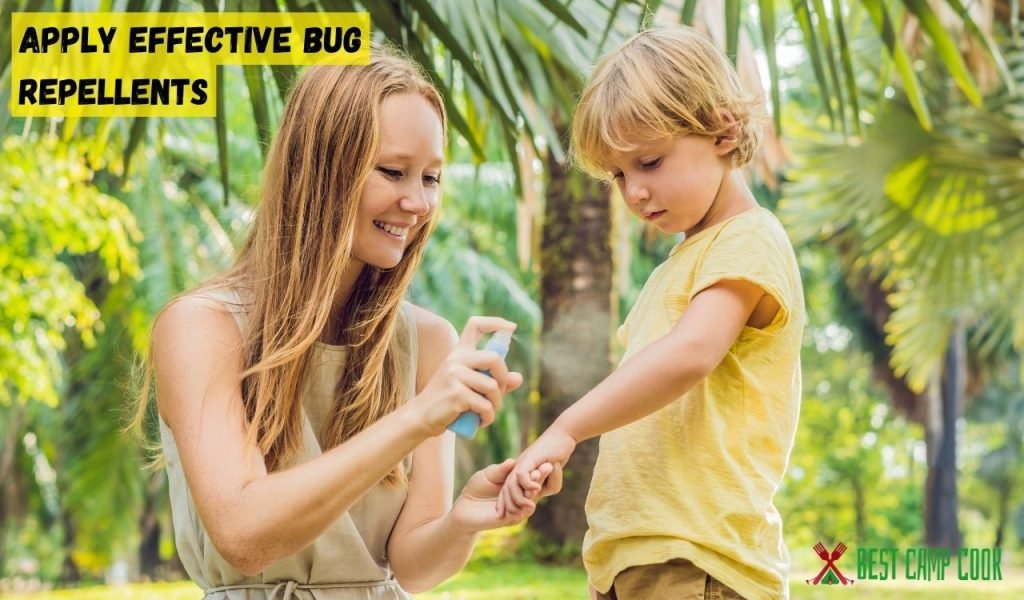
Bug repellents play a crucial role in keeping pesky insects at bay and safeguarding your camping experience. Follow these recommendations to ensure you effectively apply bug repellents and maximize their effectiveness:
Selecting the appropriate bug repellent is essential for effective protection against insects. Look for repellents that contain active ingredients such as DEET, picaridin, or oil of lemon eucalyptus (OLE). These ingredients have been proven to be effective in repelling a wide range of bugs, including mosquitoes, ticks, flies, and gnats. Consider the specific insect threats in your camping area and choose a repellent that targets those particular pests.
Carefully read and follow the instructions provided on the bug repellent’s label. Each product has specific guidelines for application, duration, and reapplication. Pay close attention to the recommended frequency of reapplication, especially if you’ll be sweating, swimming, or engaging in activities that may diminish the effectiveness of the repellent. Adhering to the instructions will ensure optimal protection throughout your camping adventure.
Apply bug repellent directly to exposed skin areas, ensuring comprehensive coverage. Focus on areas where bugs are more likely to bite, such as the arms, legs, ankles, and neck. Use your hands to evenly distribute the repellent, taking care to avoid sensitive areas like the eyes, mouth, and open wounds. Remember to apply repellent to areas where clothing fits loosely or where insects may find their way inside, such as cuffs, collars, and waistbands.
Enhance your bug protection by treating your clothing and camping gear with repellents. Many repellents come in aerosol or pump spray forms, specifically designed for treating clothing, shoes, tents, sleeping bags, and other outdoor equipment.
Follow the product instructions to apply the repellent evenly and allow it to dry thoroughly before wearing or using the treated items. Treating your gear adds an extra layer of defense against bugs and reduces the likelihood of bites while camping.
If you prefer a more natural approach, several essential oils and plant-based repellents can provide some level of bug protection. Examples include citronella, lavender, eucalyptus, and peppermint oils.
While these natural alternatives may offer limited effectiveness and shorter durations compared to synthetic repellents, they can still provide some relief from bugs. Keep in mind that natural repellents may need to be reapplied more frequently.
When applying bug repellents to children or pets, take extra precautions to ensure their safety. Choose repellents specifically formulated for their age or species and follow the instructions provided.
Avoid applying repellents to children’s hands, as they may put them in their mouths.Use your hands to apply the repellent on their skin instead. For pets, consult with a veterinarian to determine the most suitable bug repellent products to use.
Proper storage and disposal of bug repellents are essential for safety and environmental reasons. Keep repellents in their original containers and store them out of reach of children and pets.
Avoid exposing repellents to extreme temperatures, as this can affect their effectiveness.When disposing of empty repellent containers, follow local waste disposal guidelines to minimize environmental impact.
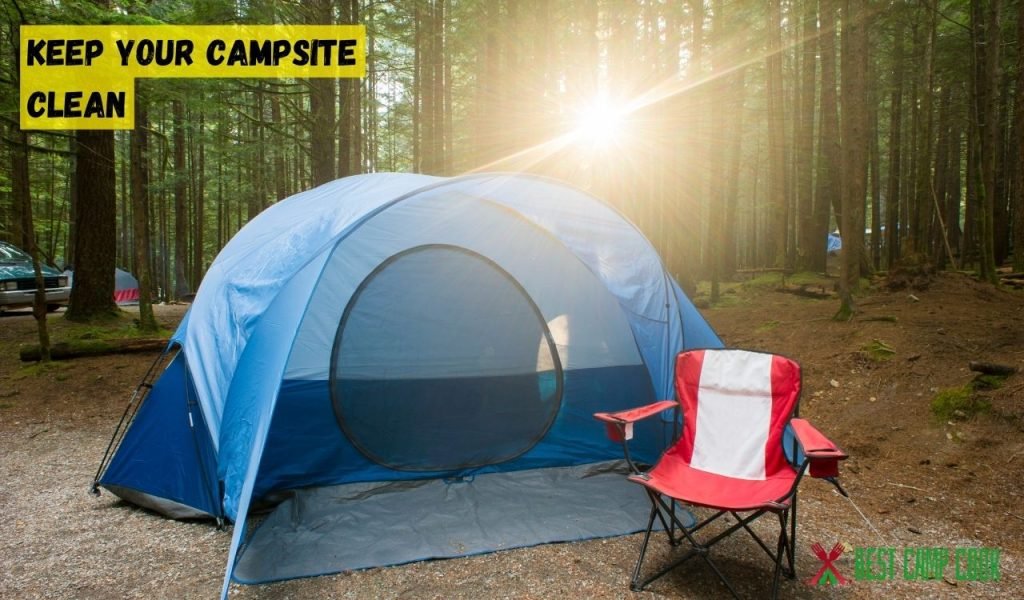
A clean campsite is a bug-free campsite. Bugs are attracted to food scraps, sweet smells, and trash, so maintaining cleanliness is crucial. Here are some tips to help you keep your campsite pristine:
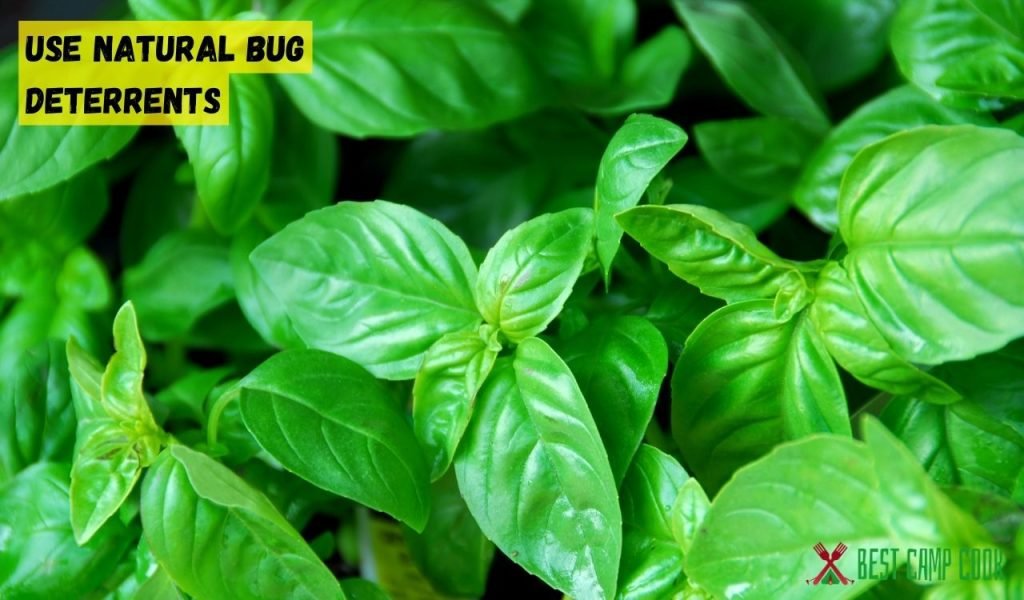
Nature provides us with various bug deterrents that can help keep insects away from your campsite. Here are some natural remedies you can use:
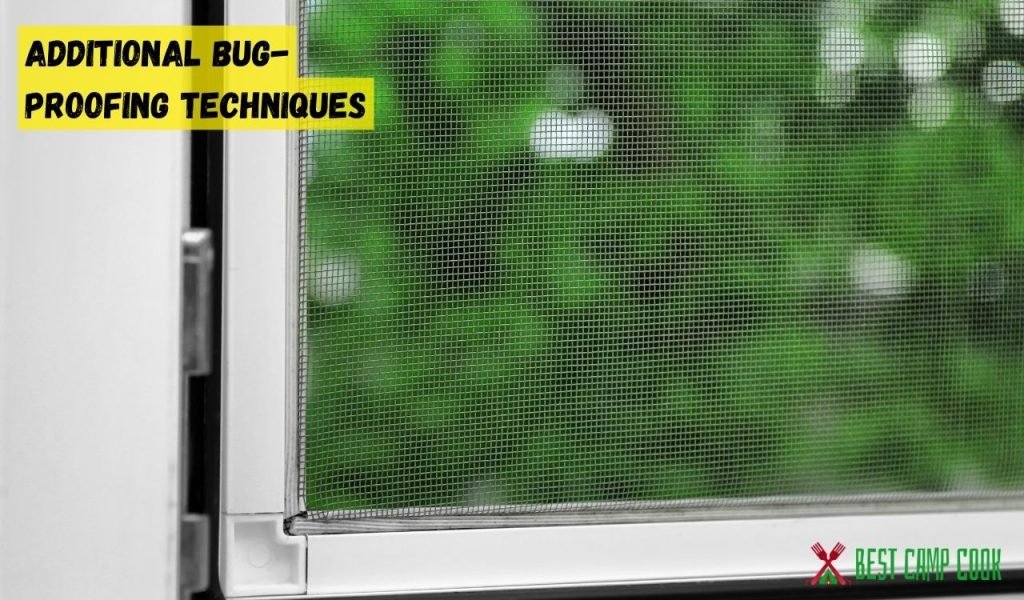
In addition to keeping your campsite clean and using natural bug deterrents, there are other effective bug-proofing techniques you can employ:
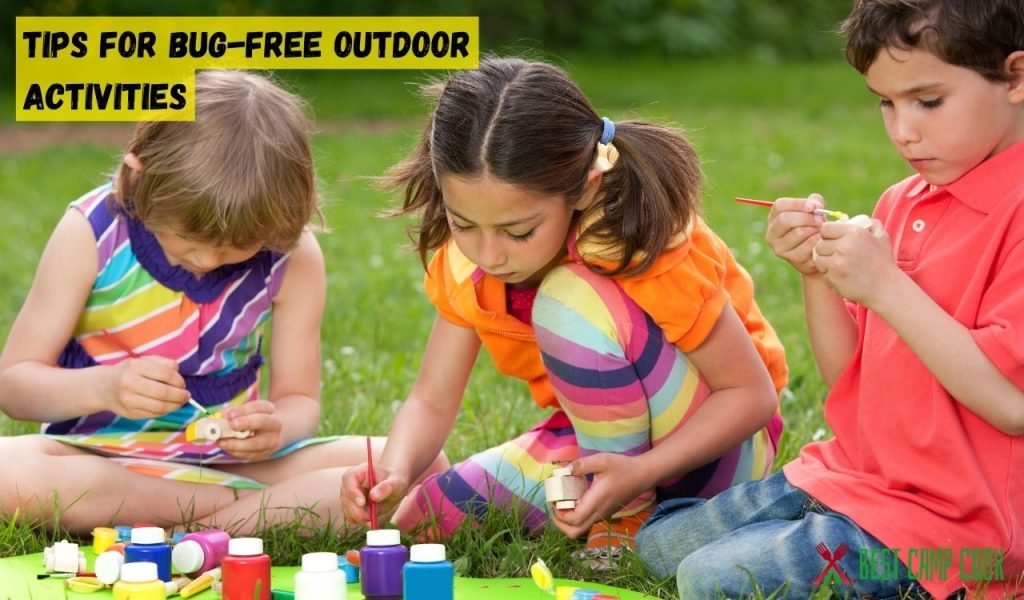
Engaging in outdoor activities while keeping bugs at bay can be challenging but not impossible. Here are some tips for bug-free outdoor adventures:
In conclusion, keeping bugs away when camping is crucial for a comfortable outdoor experience. By choosing the right campsite, setting up strategically, dressing appropriately, and applying effective bug repellents, you can minimize bug encounters. Keep your campsite clean, utilize natural bug deterrents, and employ additional bug-proofing techniques like bug screens and mesh covers.
During outdoor activities, time your excursions wisely, cover up with suitable clothing, and stay on established trails. These tips will help you enjoy a bug-free camping trip and make the most of your time in nature. Happy camping!
Natural bug repellents for camping include essential oils like citronella, eucalyptus, and lavender. You can also use herbal sprays made from ingredients like neem oil or peppermint oil. Additionally, burning sage or using candles with lemongrass or geraniol can help repel bugs.
To keep mosquitoes away, eliminate standing water where they breed, use mosquito nets or screens around your sleeping area, and wear long-sleeved shirts and pants. Applying insect repellents containing DEET or picaridin can also provide effective protection.
Yes, several plants are known to repel bugs. Some examples include marigolds, basil, lemongrass, and lavender. Planting these around your campsite can help deter insects.
To prevent ticks, wear long pants and sleeves, tuck your pants into your socks, and use insect repellents containing at least 20% DEET. Perform thorough tick checks after spending time in grassy or wooded areas.
Yes, natural remedies like aloe vera, tea tree oil, or witch hazel can help soothe bug bites. Applying ice packs or taking antihistamines can also alleviate itching and discomfort.
To repel ants, store food in sealed containers, clean up spills immediately, and create a barrier around your camping area using substances like cinnamon, chalk, or citrus peels. Avoid leaving food or sugary items exposed.
Natural remedies for mosquito bites include applying calamine lotion, honey, or diluted apple cider vinegar to reduce itching. Applying a cold compress or taking over-the-counter antihistamines can also provide relief.
Campfires can help repel some bugs, especially mosquitoes and gnats, due to the smoke and heat they produce. However, their effectiveness may vary, and it’s important to follow local fire regulations and ensure safe campfire practices.